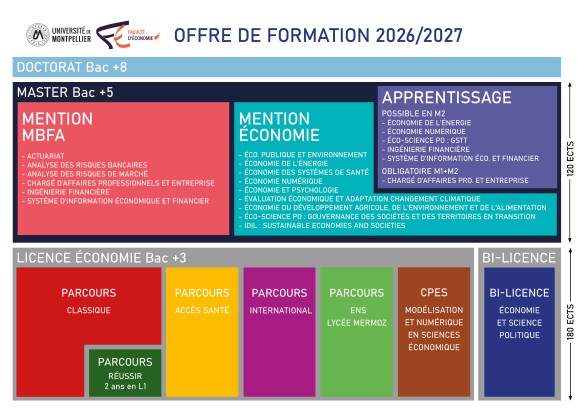Target level of study
Master's degree
ECTS
120 credits
Duration
2 years
Training structure
Faculty of Economics
Language(s) of instruction
French
Presentation
The Master's degree in Economics meets the need for skills related to major societal challenges and recent economic transformations. It addresses major transitions in the fields of the environment, food and agroecology, energy, digital technology, health, and, more broadly, public policy.
The proposed courses are led by three research teams: ART-Dev , CEE-M, and MRE. They are in line with the University of Montpellier's thematic priorities, which are divided into three areas: Feeding, Caring, and Protecting.
- promote ecologically innovative agriculture, contributing to food security and environmental quality;
- encourage the transition to a society that manages its resources and environment sustainably;
- improve human health in changing environments.

The advantages of the training program
- SOLID AND VERSATILE TRAINING
- A STRONG CONNECTION TO THE PROFESSIONAL WORLD
- A DIVERSITY OF BACKGROUNDS
Objectives
- Train economists capable of analyzing economic, social, health, environmental, and technological transformations and understanding the issues involved at different levels.
- Develop strong skills in public policy design, evaluation, and management by utilizing appropriate theoretical and empirical tools.
- Understand contemporary issues related to food, the environment, energy, health, and digital technology, and be able to offer informed analysis.
- Appropriate the most recent contributions from economic research in order to mobilize up-to-date knowledge in analysis and decision-making.
- Providing economic expertise to support regional, national, and international efforts to accompany societal transformations.
- Use, analyze, and interpret economic data, and be able to present and rigorously argue the results obtained.
- Write summary notes, reports, and decision-making support documents, demonstrating critical thinking, scientific rigor, and synthesis skills.
International dimension
Students can spend a semester or a year at one of the 60 universities with which the Faculty of Economics has exchange programs.
Organization
Special facilities
Students with disabilities, young entrepreneurs, and high-level athletes can benefit from personalized support.
This may take the form of study arrangements, educational adaptations, or specific rights, in order to enable them to best balance their personal or professional constraints with their university education. Depending on the situation, these measures may include an adapted schedule, adjusted assessment methods, attendance facilities, individualized monitoring, or dedicated support services.
Open alternately
The Master's degree in Economics offers several tracks that allow students to pursue a Master 2 degree through an apprenticeship program:
- Energy Efficiency
- Digital Economy
- Governance of Companies and Territories in Transition
The apprenticeship program is based on alternating between theoretical and applied courses taught at the university and the acquisition of professional skills with an employer.
The apprenticeship contract is a special employment contract that allows students to benefit from dual status: student and full-time employee of the company.
economie.edu.umontpellier.fr/career/apprenticeship-training/
Internships, supervised projects
Internship | Possible |
|---|---|
Internship abroad | Possible |
All Master's programs offer the possibility of doing an internship.
In Master 1, internships are possible and optional. They must be related to the program.
The internship may begin at the end of the second semester exams or be completed during university vacation periods. In any case, it must end no later than August 31.
In Master 2, the internship is mandatory.
The start date is set in agreement with the academic supervisor, generally between February and March, in order to fit in with the training schedule and the requirements of the final thesis. Regardless of the period chosen, the internship mustend no later than September 30.
Program
Select a program
Agricultural Development, Environment, and Food Economics
The Agricultural Development, Environment, and Food Economics program is designed for students who wish to acquire research-based training, mainly focused on economic analysis, while also incorporating complementary courses in management sciences and economic sociology.
This Master's program aims to train students to perform roles that require autonomy, initiative, and a thorough understanding of economic reasoning. It focuses on teaching the fundamental theoretical and methodological knowledge of contemporary economic analysis.
Significant emphasis is placed on the use of advanced modeling and quantification techniques, as well as approaches derived frominstitutional economics and management sciences. Thanks to the various specializations offered, the program also provides students with in-depth expertise applicable to many sectors of the economy, paving the way for both academic research and careers in consulting and analysis.
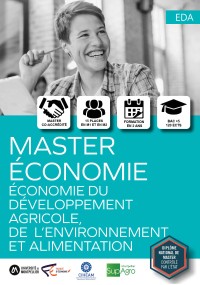
Choose one of two options:
Optional
Agricultural economics and agricultural policy
4 creditsProject management and financial evaluation
3 creditsEconometrics
Introduction to R software
Environmental economics
Individual Research Project
Public economics
3 creditsSurvey methods
Statistical software / Stata
Choose one of two options:
Optional
Corporate social responsibility
4 creditsEconomics of risk and uncertainty
Excel / Power BI
3 creditsNatural resource governance
4 creditsEconometrics of qualitative variables
Individual research project
5 creditsData analysis
3 creditsBehavioral economics
EU1 Core curriculum
3 creditsUE3 Specialty Course 1
Choose 3 to 4 out of 4
UE2 Methodology courses
Choose 3 out of 4
UE4 Specialty Course 2
Choose 3 out of 5
Memory
22 creditsOPTION 1
10 creditsChoose 2 out of 4
Seminar 1 (Supagro)
2 creditsSeminar 3
2 creditsSeminar 4
2 creditsSeminar 2 (Supagro)
2 credits
Research support tutorial (Supagro)
Energy Efficiency
Created in 1992 by Professor Jacques PERCEBOIS, the Energy Economics program atthe University of Montpellier has been training applied economists specializing in energy issues for more than thirty years. It provides students with the essential skills to analyze and anticipate the effects of structural changes in the sector: decarbonization and decentralization of production methods, changes in market models and energy pricing, and the development of new energy uses.
The Master's program draws on close relationships with public and private stakeholders in the energy sector, who regularly contribute through lectures, professional seminars, and consulting projects.
In the second year (M2), the program is also open to apprenticeships, offering students the opportunity to alternate between academic training and professional experience within companies, public institutions, or organizations in the energy sector. This approach promotes rapid integration into the job market and in-depth development of operational skills.

Introduction to SAS
Project management and financial evaluation
3 creditsEconometrics
Energy saving 1
2 creditsIntroduction to R software
Network regulation
Environmental economics
Individual Research Project
Public economics
3 creditsSurvey methods
Choose one of two options:
Optional
Energy saving 2
3 creditsIndustrial organization
4 creditsNetwork economics
3 creditsEnergy geopolitics
Excel / Power BI
3 creditsEconometrics of qualitative variables
Individual research project
5 creditsData analysis
3 creditsChoose one of two options:
Optional
Electricity savings
4 creditsEnergy and development
4 creditsIntroduction to Energy Physics
3 creditsSmart grids, energy, and mobility
3 creditsTransportation, energy, and environment
4 creditsFinancing renewable projects
2 creditsLegal framework for renewables
3 creditsEnglish
2 creditsClimate and energy transition economics
3 creditsEnergy market design
3 creditsGreen finance and market finance
2 credits
Energy market design
3 creditsSeminars/Conferences and Consulting Projects
4 creditsLow-carbon innovation
3 creditsMemory
Choose one of two options:
M2 initial energy memory
10 creditsM2 Energy apprentice supervised project
10 credits
Energy law and market regulation
2 creditsEnergy efficiency
3 creditsProfessional seminars and conferences
5 creditsLegal framework for renewables
3 creditsInternship (apprenticeship)
10 creditsConsulting project
4 credits
Digital Economy
The Digital Economy track of the Master's in Economics provides students with in-depth knowledge and skills regarding the functioning and structure of the telecommunications, Internet, and media markets, as well as the strategies of companies in the digital sector and the regulatory frameworks governing these markets.
The program draws on the expertiseof faculty members and professionals specializing in the digital economy. Courses and seminars provide solid technical skills, particularly in data processing and analysis, and develop a detailed understanding of the strategies deployed by various players in the digital sector: telecommunications operators, Internet and media companies, online service platforms, and social networks.
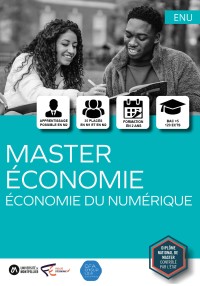
Digital transformation of the economy
Econometrics
Introduction to R software
Network regulation
Data mining and big data
Computer tools for the Web 1
4 creditsIndividual Research Project
Law and economics
2 creditsData warehouse
Choose one of two options:
Optional
IT tools for Web 2.0
4 creditsEconomics of innovation and intellectual property
3 creditsIndustrial organization
4 creditsNetwork economics
3 creditsInvestment choices
2 creditsDigital business model
3 creditsEconometrics of qualitative variables
Individual research project
5 creditsChoose one of two options:
Optional
Professionalization tools 1
2 creditsSmart grids, energy, and mobility
3 creditsPricing strategy
3 creditsComputer processing of data
3 creditsBusiness English & Managerial Communication
2 creditsIndustrial economics
3 creditsPromoting innovation
2 creditsInternet and platform economy
3 creditsDigital media economics
3 creditsCompetition policy
3 creditsApplied econometrics
3 credits
Competition law
2 creditsMemory
Choose one of two options:
Professionalization tools 2
3 creditsInternship (apprenticeship)
20 creditsProfessional seminars
5 creditsOptional
Public Economics and Environment
The Public Economics and Environment track of the Master's in Economics program trains students to analyze collective choices in the face of growing pressure on the environment from human activities. These issues involve complex trade-offs, incorporating identifiable costs, diffuse impacts, and benefits that are often unevenly distributed among stakeholders and generations. The economic approach is a decision-making tool for public actors, organizations, and companies faced with these issues.
The program provides in-depth knowledge of environmental economics and natural resources, as well as public economics, which studies the mechanisms and criteria of collective choice. These two complementary fields enable the design of policies and mechanisms that are both economically efficient and socially and politically sustainable.
The program draws on the expertise of a teamof specialized faculty and researchers from the Montpellier Center for Environmental Economics.

Game theory
Econometrics
Development economics
4 creditsIntroduction to SAS
Individual Research Project
Environmental economics
Public economics
3 creditsSurvey methods
Choose one of two options:
Optional
Corporate social responsibility
4 creditsExcel / Power BI
3 creditsEconomics of risk and uncertainty
Natural resource governance
4 creditsEconometrics of qualitative variables
Individual research project
5 creditsData analysis
3 creditsBehavioral economics
Optional
Choose one of two options:
Economics of biodiversity and natural resources
3 creditsChoice experiment
Public economic calculation
3 creditsEnvironmental economics and policy
2 creditsSocial incentives and preferences
3 creditsTopics in experimental and behavioral economics
Social Dilemmas
3 creditsEnvironmental information and labels
3 creditsStatistical method
3 creditsEvaluation of non-market effects
3 creditsProtection of ecosystems
2 credits
Taxation and the environment
2 creditsGlobalization and the environment
2 creditsPolitical economy of environmental policy
2 creditsHealth and environment
2 creditsEconomics of justice and fairness
Research or internship thesis
13 creditsCircular economy
3 creditsGame Theory 2
4 credits
Economics and Psychology
The Economics and Psychology track of the Master's in Economics program trains specialists inexperimental and behavioral analysis in the humanities and social sciences. It prepares students to design, implement, and utilize survey and experimental methods, both in the laboratory and in the field.
The program closely combines theoretical approaches and practical applications. Students participate in experimental projects and develop their own protocols, from designing and programming experiments to collecting and analyzing data. A central focus is placed on studying individual and collective behaviors and taking them into account in the evaluation of public policies.

EU Econometrics M1 ECOPSY
Experimental Economics 1
2 creditsGame theory
Econometrics
Individual Research Project
Survey methods
UM3 research methodology
Statistical software / Stata
Choose one of two options:
Economics upgrade
3 creditsUpgrade in Psychology (UM3)
3 credits
Optional
Choose one of two options:
UM3 research methodology
Individual Research Project
Introduction to R software
Cognitive functions
3 creditsStatistical software / Stata
English
Game theory
Survey methods
Experimental Economics 1
2 credits
Social Psychology (UM3)
4 creditsExperimental Economics 2 (UM3)
3 creditsEconomics of risk and uncertainty
Cognitive psychology
2 creditsEconometrics of qualitative variables
Individual research project
5 creditsBehavioral economics
Optional
Cognitive psychology
2 creditsEconometrics of qualitative variables
Economics of risk and uncertainty
Corporate social responsibility
4 creditsExperimental Economics 2 (UM3)
3 creditsBehavioral economics
Individual research project
5 credits
Choice experiment
Cognitive biases 1 (UM3)
3 creditsSocial incentives and preferences
3 creditsTopics in experimental and behavioral economics
Social Dilemmas
3 creditsResearch Methodology 2 (UM3)
3 creditsEnglish (UM3)
3 creditsStatistical method
3 creditsProgramming software for conducting experiments
3 creditsExperimental design (UM3)
3 credits
Project (Thesis)
15 creditsNonparametric tests
3 creditsEconomics of justice and fairness
Topics in social psychology (UM3)
3 creditsCognitive biases 2 (UM3)
2 creditsGame Theory 2
4 creditsTopics in neuroscience and cognitive psychology (UM3)
4 credits
Health Systems Economics
The Health Systems Economics program is part of the Master's degree in Economics at the Faculty of Economics, within the Law-Economics-Management field.
It is dedicated to analyzing the economic challenges facing healthcare systems. An aging population and technological advances in healthcare are leading to major changes inthe organization of care and the financing of healthcare systems. These transformations are promoting a more integrated approach to patient care pathways and are accompanied by the emergence of new players and new tools for regulating healthcare provision.
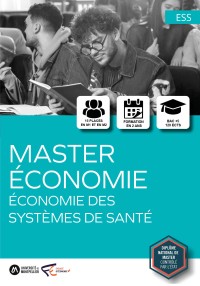
Choose one of two options:
Introduction to SAS
Project management and financial evaluation
3 creditsDigital transformation of the economy
Econometrics
Introduction to R software
Individual Research Project
Law and economics
2 creditsSurvey methods
Healthcare and social protection system
5 creditsOptional
Optional
Choose one of two options:
Economics of innovation and intellectual property
3 creditsIndustrial organization
4 creditsHealthcare system regulation
Excel / Power BI
3 creditsEconometrics of qualitative variables
Individual research project
5 creditsData analysis
3 credits
Double difference methods
3 creditsHealth and Digital Technology
3 creditsHealth and territories
2 creditsEvaluation of public policies
Multidisciplinary primary care and care pathways
2 creditsMeasuring well-being in assessment methods
2 creditsAdvanced SAS
2 creditsEnglish
2 creditsEconomic assessment and market access
2 creditsPrinciples of medical-economic evaluation
3 creditsEvaluation of non-market effects
3 creditsIntroduction to epidemiology and clinical research methods
3 creditsDouble difference method
3 credits
Economic Assessment and Climate Change Adaptation
The Economic Assessment and Climate Change Adaptation program is based on a solid foundation of economic assessment methods applied to public policy and regional projects, with a specialization inclimate change adaptation issues. It incorporates the dimensions of consultation,policy acceptability, andbehavioral economics to analyze incentive mechanisms and stakeholder responses to environmental policies.
The first year of the Master's program offers a high degree of mutualization of methodological teaching (econometrics, multivariate analysis) with several tracks within the major, notably Public Economics and Environment. It includes an individual research project (IRP) conducted over the course of the year, designed to develop students' autonomy in analyzing issues and the operational use of quantitative tools.
Specialization begins in the second year with modules dedicated toassessment andadaptation, linked to courses focused on the environment, energy, development, and health.
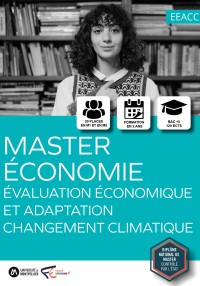
Choose one of two options:
Optional
Introduction to SAS
Project management and financial evaluation
3 creditsEconometrics
Introduction to R software
Development economics
4 creditsEnvironmental economics
Individual Research Project
Public economics
3 creditsSurvey methods
Optional
Choose one of two options:
Cognitive functions (UM3)
Corporate social responsibility
4 creditsEnergy geopolitics
Economics of risk and uncertainty
Excel / Power BI
3 creditsNatural resource governance
4 creditsEconometrics of qualitative variables
Individual research project
5 creditsData analysis
3 creditsBehavioral economics
Double difference methods
3 creditsPublic economic calculation
3 creditsTopics in experimental and behavioral economics
Evaluation of public policies
Outlook and climate
3 creditsMeasuring well-being in assessment methods
2 creditsEnvironmental information and labels
3 creditsStatistical method
3 creditsClimate and energy transition economics
3 creditsEvaluation of non-market effects
3 credits
Choice experiment
Memory
15 creditsLow-carbon innovation
3 creditsPolitical economy of environmental policy
2 creditsComputer graphics
Consultation method
Response to calls for tenders
Examples: Energy transition roadmap and cost analysis
Vulnerability of territories
4 creditsModeling support in the face of climate uncertainty
2 credits
Governance of Companies and Territories in Transition
The dual-discipline Master's degree in Economics and Political Science, " Governance of Societies and Territories in Transition (GSTT)," is an extension of the dual-degree program in economics and political science created in 2021 atthe University of Montpellier. It offers students a demanding and in-depth education in these two disciplines and is aimed at those with a solid background in social sciences, particularly economics and political science. This program aims to prepare students for emerging professions or sectors undergoing profound change.
The program has been designed in close connection with the major contemporary issues that are transforming societies and territories, such as energy and ecological transitions, transport and mobility issues, health, digital technology, as well as democratic and cultural transitions and institutional developments.
Unique in France, this multidisciplinary Master's program is based on a balanced collaboration between the economics and political science teams at the University of Montpellier.
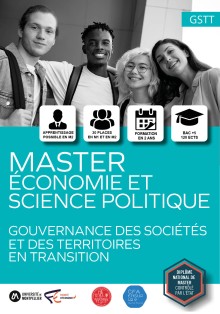
Optional
EU Public Action and Governance
4 creditsEnergy saving 1
2 creditsComputer science applied to projects
2 creditsEU Quantitative Studies
Economic analysis of public policies
4 creditsMethodology of the thesis
Artificial intelligence and societies
3 creditsEU Political Sociology of Gender
2 creditsEnglish
Environment and Policy (ST)
Economic analysis and project finance
4 credits
Optional
EU Local government
3 creditsMethodology of the thesis
EU Environmental law
2 creditsHealthcare system regulation
Econometrics of qualitative variables
EU New security challenges
3 creditsMemory
4 creditsEnergy geopolitics
English
2 creditsTerritorial economy
2 creditsEconometrics of qualitative variables
EU Migration, societies, and territories
2 creditsMedia and society
2 creditsComparative Politics (ST)
Territories and inequalities
4 creditsDigital economics and policy
3 creditsGovernance of metropolitan areas
4 creditsCultural policies
4 creditsSustainable transport and mobility
3 creditsEnvironment and health
2 creditsNatural resource governance
3 creditsEnergy and environmental transition
3 credits
Optional internship for professional integration
Choose one of two options:
Internship
20 creditsMemory
20 credits
Collective project
8 creditsSupervised project
2 creditsOptional
IDIL - Sustainable Economies and Societies
The Sustainable Economies and Societies program is part of the IDIL – Interdisciplinary In Lab graduate program at the University of Montpellier, which brings together excellent courses based on research and interdisciplinarity. Taught in English at the Faculty of Economics, this master's program aims to train students to analyze and support economic and social transformations related to the major challenges of sustainability.
The program is fully integrated into the University of Montpellier's thematic areas: Feeding, Caring, and Protecting. It offers an interdisciplinary approach to economic research, structured around the design, implementation, and evaluation of public policy.
In-Lab pedagogy places students at the heart of research projects conducted in collaboration with laboratories and in interaction with socio-economic actors. This approach encourages experimentation, multidisciplinary teamwork, and learning through research.
Open to an international audience, the program prepares students for doctoral studies as well as professional careers in business or public and private organizations. Particular emphasis is placed on sustainable development and innovation policies in relation to territorial and societal transitions.
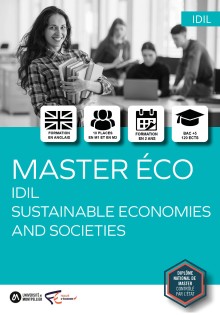
Mediterranean Farming System Design for a Sustainable Food System (MIDAS)
The MIDAS course is a continuation of the intensive training programs offered since 2010 by CIHEAM-IAMM, in partnership with Mediterranean agricultural research and teaching institutes and the international Farming System Design (FSD) network. More than 300 international participants have been trained in this framework.
Initially focused on analyzing and evaluating the sustainability of agricultural systems through integrated approaches, these training courses are evolving with MIDAS towards the design of agricultural systems adapted to current food, climate, and economic challenges. The program places particular emphasis on the diversity of cropping systems, farms, and stakeholders as a lever for resilience in the face of climate change and market uncertainties.
Territorial Agricultural Development, Environment, and Modeling (DATEM)
The DATEM program responds to a request from the Lebanese Ministry of Agriculture and the Faculty of Agronomy at the Lebanese University to train engineers capable of responding to new challenges: resource scarcity, climate change, and market instability in a tense regional context.
The training develops skills that have been lacking locally until now, in particular:
-
modeling agricultural systems to design systems that are resilient to climate and socioeconomic uncertainties
-
the integration of environmental issues intothe assessment of agricultural performance
Unique in its field for the southern Mediterranean countries, it provides training inmulti-criteria analysis, territorial agricultural development, andenvironmental assessment.
It prepares students for engineering positions within the Ministries of Agriculture, local authorities, and regional extension services in connection with the restructuring of the regional agricultural sector.
Admission
Admission requirements
- For Master's 1: Holder of or currently pursuinga bachelor's degree (or equivalent, three years of higher education) in economics or a similar field, recognized in France or Europe.
- For the Master 2: Have completed at least 4 years of higher education (Bac +4 / 240 ECTS) in fields related to economics or similar. A strong academic record and, in some cases, professional experience are valued.
Registration procedures
First year of master's degree: If you wish to apply for admission to Master 1, you must submit your application on the Mon Master platform .
Second year of master's degree: To gain admission to the second year of a master's degree program on the basis of equivalence, the ecandidat procedure is mandatory.
economie.edu.umontpellier.fr/applications/applications-and-admissions/
Tuition fees
Tuition fees are set each year by the Ministry of Higher Education. They are accompanied by the Student and Campus Life Contribution (CVEC). Both are exempt for students receiving scholarships.
Recommended prerequisites
A good level inmicroeconomics, macroeconomics, mathematics, statistics, and econometrics is essential. Depending on the desired career path, certain options may be valued.
And after
Continuing education
Master's degree graduates can continue their studies, particularlyin economics, in France or abroad, especially those who are interested in research or higher education. Additional specialized training (university degrees) may also be considered depending on career plans.
Professional integration
The program prepares students for a variety of careers in the public and private sectors: research officers, project managers, or executives in government agencies, local authorities, NGOs, or international organizations (UN, World Bank, FAO, UNDP, etc.).
In the private sector, career opportunities include engineering firms, consulting firms, and companies in various sectors (energy, telecommunications, pharmaceuticals, commerce, logistics, cybersecurity). It is possible to pursue doctoral studies.



